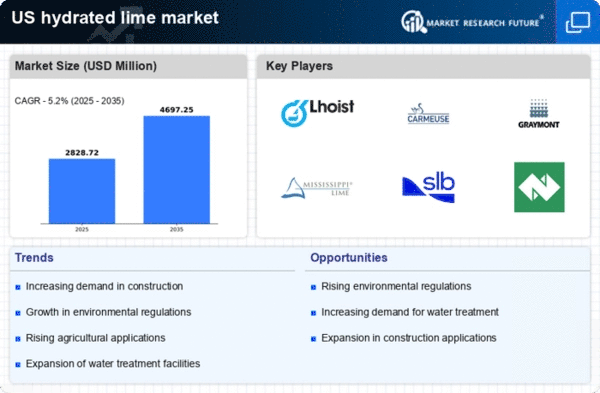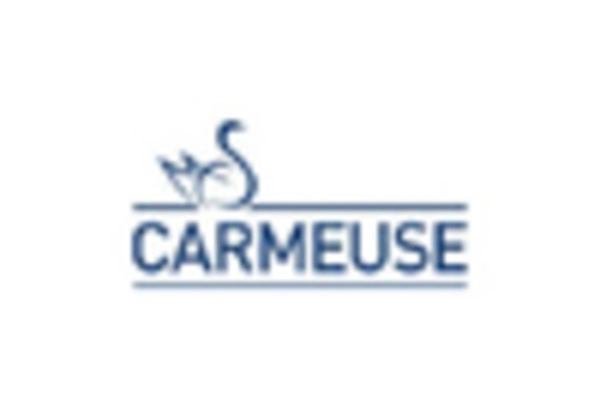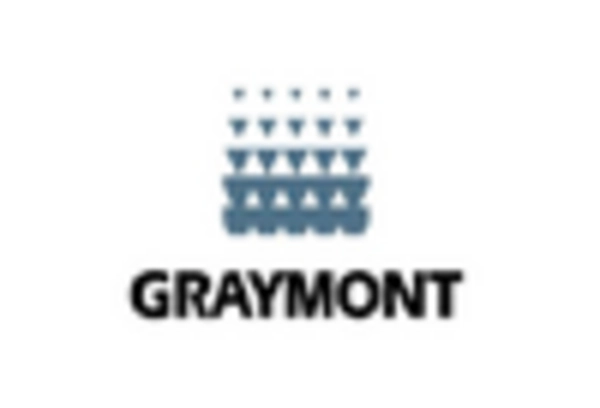The hydrated lime market in the US is characterized by a competitive landscape that is increasingly shaped by innovation, sustainability, and strategic partnerships. Key players such as Lhoist Group (BE), Carmeuse (BE), and Graymont (CA) are actively pursuing strategies that emphasize operational efficiency and market expansion. Lhoist Group (BE) has focused on enhancing its product portfolio through technological advancements, while Carmeuse (BE) has been investing in sustainable practices to meet the growing demand for environmentally friendly solutions. Graymont (CA) appears to be concentrating on regional expansion, particularly in the western US, to capitalize on local market dynamics. Collectively, these strategies contribute to a moderately fragmented market structure, where competition is driven by both product differentiation and operational excellence.In terms of business tactics, companies are increasingly localizing manufacturing to reduce transportation costs and enhance supply chain resilience. This approach not only optimizes logistics but also allows for quicker response times to market demands. The competitive structure of the hydrated lime market is moderately fragmented, with several key players exerting influence over pricing and product availability. The collective actions of these companies indicate a trend towards consolidation, as they seek to leverage economies of scale and enhance their market positions.
In October Mississippi Lime Company (US) announced a strategic partnership with a leading construction firm to supply hydrated lime for sustainable building projects. This collaboration is significant as it aligns with the growing trend towards green construction practices, positioning Mississippi Lime Company (US) as a key player in the sustainable materials sector. The partnership not only enhances their market visibility but also reinforces their commitment to sustainability, which is increasingly becoming a critical factor in customer decision-making.
In September Carmeuse (BE) launched a new line of hydrated lime products specifically designed for the water treatment industry. This product innovation is noteworthy as it addresses the rising regulatory pressures for cleaner water solutions. By diversifying its product offerings, Carmeuse (BE) is likely to capture a larger share of the market, particularly as municipalities seek compliant and effective solutions for water purification.
In November Graymont (CA) completed the acquisition of a regional lime producer, which is expected to enhance its production capacity and market reach. This acquisition is strategically important as it allows Graymont (CA) to strengthen its foothold in the eastern US market, where demand for hydrated lime is projected to grow. The move reflects a broader trend of consolidation within the industry, as companies seek to enhance their competitive positioning through strategic acquisitions.
As of November the hydrated lime market is witnessing trends that emphasize digitalization, sustainability, and the integration of advanced technologies. Companies are increasingly forming strategic alliances to enhance their competitive edge, focusing on innovation rather than solely on price competition. This shift suggests that future differentiation will hinge on technological advancements, supply chain reliability, and the ability to meet evolving customer expectations for sustainable products. The landscape is likely to evolve further as companies adapt to these trends, positioning themselves for long-term success in a dynamic market.

















